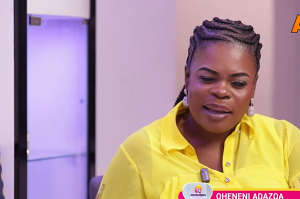Security Personnel in the country who take to social and new media platforms to engage in unruly conduct will soon face punitive measures as a policy is being drafted to regulate the growing indiscipline among some personnel in terms of social media use.
The move, according to the security apparatus, aims at preventing soldiers, policemen and women, fire service personnel and immigration service officials, among others, from disgracing the image of the various security services.
Disturbing trends observed by the DAILY HERITAGE on social media show that security personnel in uniform, without regard to authority of the uniform, take selfies and snapshots and splash them on social media platforms, while others are found Facebook, for instance, drinking alcohol and dancing at events without regard to the image of the service they serve.
Leadership not happy
The leadership of the various security agencies, in separate interviews with the DAILY HERITAGE, described the situation as worrisome. So far, there is no detailed legal regulation to guide personnel’s behaviour on social media.
However, the DAILY HERITAGE can confirm that some of the security agencies, particularly the Ghana Police Service, Ghana Armed Forces (GAF) and Ghana Prisons Service, are in the process of putting together a regulation to arrest this growing concern.
Unlike the police, military and prisons, the Ghana National Fire Service (GNFS) and Ghana Immigration Service (GIS) are yet to consider any social media policy.
For now, they rely on general rules regarding their relationship with the media. But, both conceded that in future the proponents of their regulations should look at drafting a social media policy for them.
Subject matter
With the advent of social media, a lot has changed within the security service. Checks reveal that its usage by some security personnel is condemnable. On Instagram, twitter, facebook, WhatsApp, Hi 5, viber and others, some of these personnel are seen misconducting themselves to disgrace the image of the security apparatus.
There are various instances of officers posting videos of themselves sometimes at drinking bars. Relatives of some of these personnel are also seen posing in security uniforms as though they were officers.
Police
The Director General (DG) of the Ghana Police Service, Assistant Commissioner of Police (ACP) David Eklu, told the paper in that though the service has disciplinary codes, it has found it needful to put specific emphasis on how personnel get information and share it.
“We have drafted some regulations for responsible use of social media in the police service, so it does not negate our investigations. When validated, it would become a public document in dealing with social media,” the DG explained.
He said the draft had been worked on for the past one year and would be an internal document to regulate the conduct of officers and to maintain high standards, especially in the era of technology.
“We don’t encourage that because it has its own effect and so we have circulars to ensure that our men don’t WhatsApp or use their headphones when on duty.
“We want to do things in a professional manner and social media is instant and easy for people to be carried away if not carefully guided. It could jeopardise our investigations and also abuse the right of victims, suspects and also damage confidentiality of our investigations,” the Assistant Commissioner stated.
ACP Eklu told the paper that some police officers who had gone contrary to their disciplinary codes by way of misconducting themselves had been punished but the extent of punishment depended on the degree of the offence.
GAF
Colonel E. Aggrey-Quarshie, the Head of Public Affairs Directorate at the GAF, told the paper that, “we have rules guiding our personnel on media, but not specifically mentioned in our regulations.
“We are currently working on a new regulation titled ‘Social Media Policy’ to take care of our personnel on how they go about using social media,” he explained.
He said wearing military uniform to take pictures and circulate same on social media is not allowed and that, “our uniforms belong to the military, so we issued a statement when that Kalyppo advert came in.
“In our case, before personnel go on media you need clearance before you can do so. Some people think the uniform is for them, but as long as you are in uniform, it belongs to the military and image issues are important as well.
“So we educate our men on the use of social media. The rules regarding social media are not clear. That is why we have started drafting one. Our IT and the legal team are working together with all stakeholders so that once it’s finalised, it would cover all aspects.”
According to him, they started working on it in June 2017 and expressed the hope it would be completed soon.
GNFS
Divisional Officer Grade I, James Oheneba Yaw Kwarteng, Public Relations Officer at the GNFS, said unlike the military and the police, they had not got any policy regarding social media neither were they working on one.
According to him, any misconduct by officers are punished by the code of ethics of the service but regarding specific rules guiding them on social media, he said, “there is no clear policy.”
“Well, as far as I know, I am not aware of any regulation in the service that debars service personnel taking pictures and putting them on social media. There is a law against indecent exposure even if you are a service person and you fall foul of it, you would be dealt with. The Legislative Instrument was drafted in 1725 is our disciplinary regulation, and I don’t think I have seen anything dealing with personnel who post their pictures on social media.”
Once you are in uniform, “your behaviour differs. If you are a civilian, that one you are on your own, but representing the corporate image with the uniform you are wearing is not allowed. You are wearing it because by law you are supposed to wear it.
“So anything that you will do that will tarnish the image of the corporate institution because you can be identified in your uniform is punishable.”
GIS
Superintendent Michael Amoako-Atta, Head of Public Affairs Directorate at the GIS, said, “in terms of the security architecture, the army is the one that we all look up to, so definitely you realise that most of our regulations concerning uniform would be picked from them.
“The army, police and prisons are oldest in terms of establishment and for us at Ghana Immigration Service that just came on board; it is difficult for us to pinpoint from our regulations any of the laws that relates to the uniform and our appearance on social media,” he stated.
He further explained that “so it will be difficult to say that A or B should or should not appear on social media because now the social media has become a tool for some of us to reach out. On YouTube, you would see info-graph and videos of officers in uniform sending a message, so how do you want to query an officer who posts something on social media,” he explained.
He said “but there are certain behaviours that when one is in uniform one can be questioned on. For instance, when you find a uniformed person sitting in a public bar drinking or smoking, it is misconduct. “
The Disciplinary Committee, he said “takes action when your supervisor refers you to it.”
PRISONS SERVICE
The Ghana Prisons Service has also realised the danger social media could pose and so has begun plans to have regulations drafted to deal with it.
“We are working on a social media policy, because we recently had an issue and we dragged a media organisation to the National Media Commission.
“For now we are working on one. It’s a media policy in general which includes social media as well. It encapsulates everything about us, including our prisons, inmates and officers.”
He confirmed that one or two personnel have been sanctioned for putting the name of the service in disrepute by their attitude on social media.
He explained that it is unacceptable for officers to allow “their wives to wear the husband’s uniform. It is not allowed, we don’t allow it.”
General News of Tuesday, 20 March 2018
Source: abusuafmonline.com













